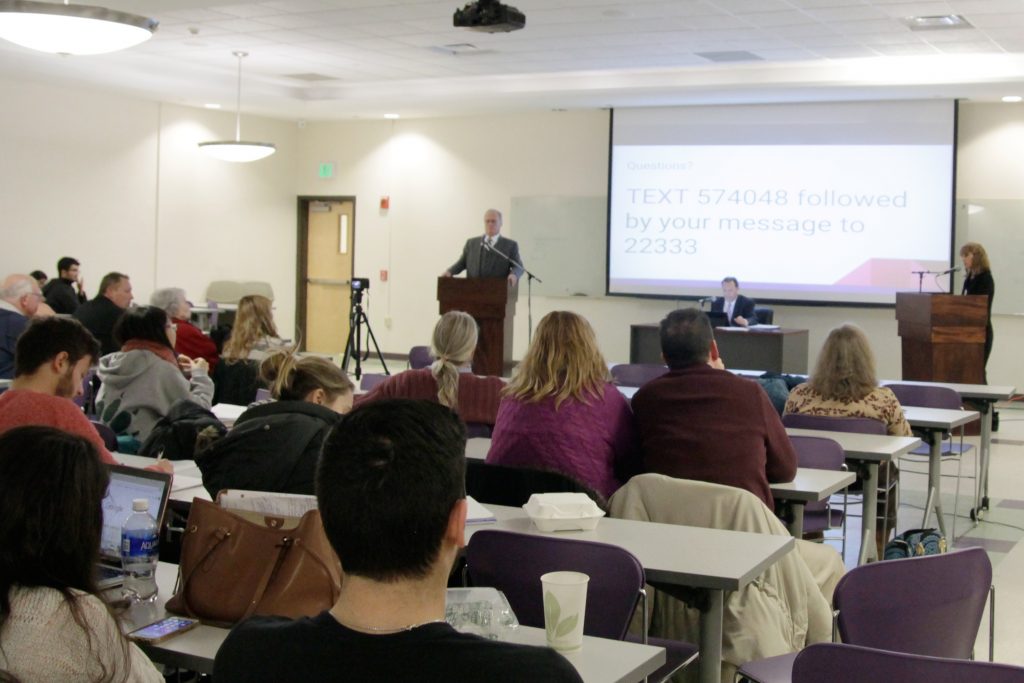
For the second installment of the “You Defend It Debate Series,” representatives from the largest organizations in New York advocating for and against stricter gun laws squared off in Old University Union.
The event, held Tuesday, was hosted by the Binghamton University Speech and Debate Team along with Defend It Inc., a local debate organization. Leah Barrett, the former executive director of New Yorkers Against Gun Violence, and Tom King, the president of the New York State Rifle and Pistol Association, fielded questions from Rob Kilmer, the founder of Defend It Inc. and moderator for the event, as well as questions texted in by attendees.
Each participant addressed multiple topics including questions on specific laws in the state of New York, the prevention of funding toward gun violence research, gun trafficking, universal background checks and concealed carry.
In response to a question focusing on the second amendment and its wording, Barrett quickly brought up the inclusion of the words “well regulated” in the clause as well as the 2008 Supreme Court case District of Columbia v. Heller, which guaranteed a person’s right to keep firearms in their house but did not approve open carry in public locations.
“I don’t believe, nor does Justice Scalia, who wrote the opinion in Heller, that people have the right to carry any kind of gun, anywhere, anytime, anyplace,” Barrett said. “All of our rights are circumscribed.”
King responded by pointing out that when the Second Amendment was written, arms did not only mean guns but also knives, bow and arrows and any other type of weapon. The amendment simply guaranteed the right to self-defense, he said, and carrying a gun falls under that right.
On the topic of funding, Barrett argued for the repeal of a 1996 law that forbids the government, especially the Centers for Disease Control and Prevention, from using funds to study guns’ effects on public health.
“There were some interesting studies coming out in the early ’90s from public health researchers showing that having a gun in the home was actually more dangerous than not having a gun,” Barrett said. “You are more likely to use it on yourself in a suicide, in an unintentional shooting or a homicide than you are to use it on a domestic intruder. I believe it was this that alarmed the corporate gun lobby more than anything.”
King said he would be willing to fund firearm research as long as it included exploring gun benefits. As of now, he said he feels all private research is being fueled by wealthy gun control advocates.
“I would like millions and millions of dollars for us to look at how many times firearms are used to prevent crimes, how many firearms have helped to save lives, but that isn’t going to happen,” King said. “This is the United States. There should be an even playing field.”
Kilmer also asked questions regarding new firearm technology like smart guns. Smart guns have a feature that only allows usage to an authorized user, similar to how many smartphones have a fingerprint scanner. King brought this comparison up in order to challenge the efficacy of this product, a concern he stated with the technology.
“Does anyone have an iPhone with touch-screen technology?” King asked. “Does it work all the time? Mine doesn’t. There are all sorts of police departments, sheriff departments and the military that say smart guns don’t work. If they don’t work for the cops, they don’t work for me.”
Barrett responded by saying that better technology is being implemented that will let an owner activate a gun through radio-frequency identification technology, which recognizes radio waves as opposed to fingerprints.
Michael Lipsitz, a junior majoring in economics who said he had recently purchased firearms himself, said that knowledge about guns was important in limiting accidents.
“I think education and gun control kind of go hand in hand,” Lipsitz said. “The more you have, the less risk of accidents. I think the more people get informed, the safer the nation will be.”
The next event in the “You Defend It Debate Series” is scheduled for Feb. 24, and will be about hydraulic fracturing.


